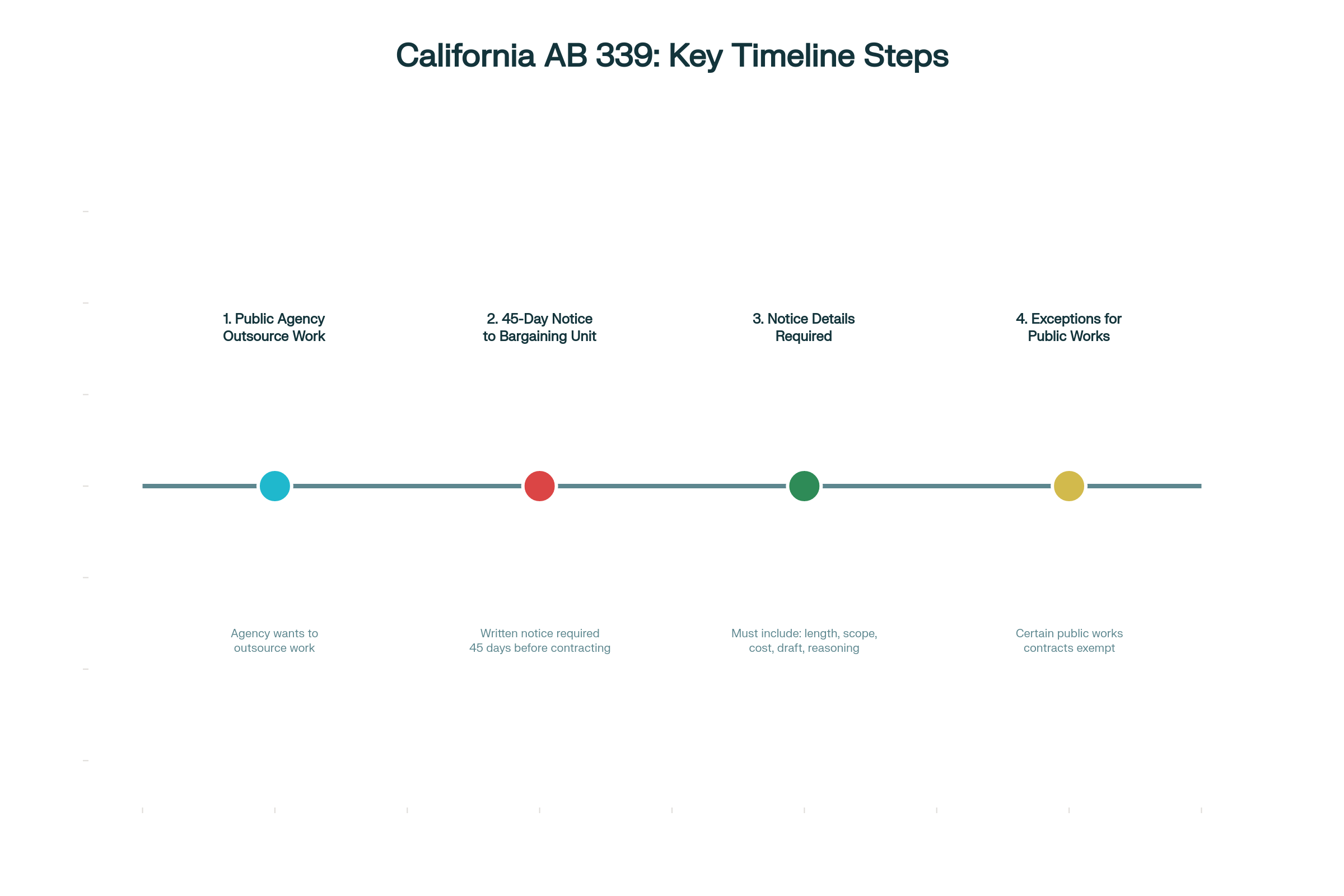AB 339 Explainer: Providing Notice to Bargaining Units

AB 339 Makes a Significant Impact on Public Agency Contracting and Labor Relations
Here's what you need to know:
AB 339, enacted on October 13, 2025, introduces Government Code Section 3504.1, requiring public entities to provide written notice to recognized employee organizations no less than 45 days before issuing requests for proposals (RFPs), requests for quotes, or renewing/extending contracts related to the scope of work of represented job classifications. Existing law requires reasonable notice to affected employee organizations regarding ordinances, rules, resolutions, or regulations proposed to be adopted by the local agency, except in cases of emergency. Further, the Meyers-Milias-Brown Act (MMBA) governs meet and confer requirements regarding wages, hours, and other terms and conditions of employment. In enacting the language of AB 339, the Legislature effectively expanded the notice requirement to include outsourcing work, without imposing meet and confer requirements when doing so.
Determining the Scope of Work
Although the Legislature has not officially defined “scope of work,” it is clear that it intended to relate the scope of work directly to the job descriptions of employees represented by the bargaining unit.
Public entities should interpret the phrase “scope of work” broadly by assessing the similarities of the work performed by the employees under recognized employee organizations relative to the intended subcontracted work. Additionally, the local agency could evaluate beforehand what changes to the existing bargaining unit might mitigate the need for subcontracting, such as agreeing to freeze pay in order to lower the cost of labor or hiring temporary employees to increase scale, to determine whether that bargaining unit’s scope of work is implicated.
Written Notice Requirement
Written notice to the recognized employee organization must include information regarding the anticipated duration of the contract, the scope of work under the contract, the anticipated cost of the contract, the reason the public agency believes the contract is necessary, and the draft solicitation or any information that would normally be included in a solicitation if it is not yet drafted. While informal notice may have been sufficient prior to AB 339, written notice is now required to provide the bargaining unit time to meaningfully assess its option to engage under the relevant bargaining agreement and potentially mitigate the need to outsource work.
No Meet and Confer Obligation
AB 399 was crafted to emphasize that the new law does not: 1) exempt contracts from the notice, meet and confer, or other requirements of applicable laws; 2) affect other bargaining rights and obligations created in other sections of Gov. Code section 3500, et seq.; 3) diminish any rights of an employee or recognized employee organization provided by a memorandum of understanding; or 4) invalidate any provision of a memorandum of understanding in effect on the operative date of section 3504.1. While an employee organization has the right to meet and confer under other applicable laws or agreements, AB 339 also allows for the employee organization to request a meet and confer without obligating the public entity to engage in collective bargaining before proceeding with the request for proposals, request for quotes, or changes to existing contracts.
Exceptions to AB 339
The Legislature incorporated exceptions to AB 339, meaning it does not apply to the following:
(1) A contract for construction, alteration, demolition, installation, repair, or maintenance work under specified sections of the Labor Code, or a contract for highly specialized data, software, or services related to that construction, alteration, demolition, installation, repair, or maintenance work.
(2) Specific contracts for services or contracts that are related to the planning, design, administration, oversight, review, or delivery of public works, residential, commercial, or industrial buildings, or other infrastructure projects subject to adopted uniform codes or standards.
Additionally, a public entity must only provide as much notice as is “practicable” in emergencies or other exigent circumstances which prevent the required 45-day notice, although ”practicable” is not specifically defined.
Reimbursement for Cost of Implementation
The new law also provides that no reimbursements for mandated costs shall be made by the state for costs associated with implementation of this section, but also recognizes that a local agency or school may pursue remedies in order to obtain reimbursement under any other applicable laws.

* Specific loan program availability and requirements may vary. Please get in touch with your mortgage advisor for more information.

